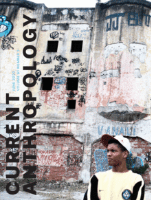
CURRENT ANTHROPOLOGY
Scope & Guideline
Exploring Cultures Through Rigorous Research
Introduction
Aims and Scopes
- Cultural Anthropology:
Investigates cultural practices, beliefs, and values within diverse societies, emphasizing ethnographic methodologies to provide nuanced understandings of human experiences. - Political Economy:
Examines the interplay of economic systems, power dynamics, and social structures, particularly in relation to issues of inequality, sovereignty, and global capitalism. - Historical and Archaeological Perspectives:
Integrates historical and archaeological findings to contextualize contemporary cultural practices and societal changes, offering insights into human development over time. - Critical Theory and Reflexivity:
Encourages critical engagement with anthropological theories and practices, promoting reflexivity among researchers regarding their positionality and the implications of their work. - Interdisciplinary Collaboration:
Fosters collaboration across disciplines, drawing on insights from sociology, political science, history, and other fields to enrich anthropological discourse. - Social Justice and Activism:
Addresses themes of social justice, equity, and human rights, exploring the role of anthropology in advocacy and activism within affected communities.
Trending and Emerging
- Digital Anthropology:
The exploration of digital cultures, online communities, and the impact of technology on human interactions is gaining traction, reflecting the increasing relevance of digital spaces in contemporary life. - Climate Change and Environmental Anthropology:
Research addressing the anthropological implications of climate change, ecological degradation, and sustainability is becoming more prominent, highlighting the urgent need for anthropological insights in environmental issues. - Racial Justice and Intersectionality:
There is a notable increase in studies focusing on race, ethnicity, and intersectionality, examining how these factors shape experiences of inequality and resistance in various contexts. - Health and Medical Anthropology:
A growing body of work is emerging that examines health disparities, medical practices, and the social determinants of health, particularly in relation to global health crises. - Transnational and Global Studies:
Research exploring transnational movements, migration, and the impacts of globalization on local cultures is on the rise, reflecting the interconnectedness of contemporary societies.
Declining or Waning
- Traditional Ethnography:
The reliance on traditional ethnographic methods has seen a decline as researchers increasingly adopt interdisciplinary approaches and innovative methodologies, such as digital ethnography. - Essentialist Views of Culture:
There is a noticeable move away from essentialist perspectives that simplify cultures into fixed identities, as scholars emphasize fluidity and intersectionality in cultural analysis. - Focus on Isolated Societies:
Research on isolated or 'primitive' societies is becoming less common, with a shift toward understanding the complexities of globalization and urban environments. - Biodeterminism:
The emphasis on biological determinism in explaining human behavior and social structures has decreased, as anthropologists increasingly recognize the roles of culture and environment. - Single-Dimensional Studies:
There is a growing preference for multi-dimensional studies that consider various factors influencing social phenomena, leading to a decline in narrowly focused research.
Similar Journals
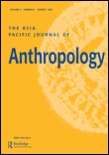
Asia Pacific Journal of Anthropology
Highlighting Innovative Research in the Asia Pacific RegionAsia Pacific Journal of Anthropology is a premier academic journal dedicated to advancing the field of anthropology and cultural studies, published by Routledge Journals, Taylor & Francis Ltd. With an ISSN of 1444-2213 and E-ISSN 1740-9314, this journal has gained recognition for its rigorous scholarly contributions since its inception in 2000. Situated in the UK, it is strategically positioned to serve as a vital resource for researchers, professionals, and students exploring the rich complexities of human societies and cultures within the Asia Pacific region and beyond. As evidenced by its Q2 ranking in both anthropology and cultural studies for 2023, alongside its impressive Scopus ranks—#218 among 1304 in Cultural Studies and #157 among 502 in Anthropology—this journal illustrates a strong commitment to delivering high-quality, impactful research. While it is not an open-access journal, it remains a key platform for disseminating innovative research and fostering academic dialogue, thereby significantly contributing to the advancement of knowledge in the social sciences.

INTERNATIONAL JOURNAL OF AFRICAN HISTORICAL STUDIES
Advancing Scholarship in African Historical NarrativesInternational Journal of African Historical Studies is a leading academic journal published by the African Studies Center at Boston University. With its ISSN 0361-7882 and E-ISSN 2326-3016, this journal serves as a vital platform for scholarly discourse in the fields of History, Cultural Studies, and Sociology. Renowned for its rigorous peer-reviewed research, the journal holds a commendable Q1 ranking in History and Q2 in Cultural Studies as of 2023, highlighting its influence and contribution to African historical scholarship. The journal has been published since 1976, consistently providing insightful analyses and critical research that engage with Africa's past and present, thereby enriching our understanding of global histories. Although it does not offer an open-access model, the journal is accessible through various academic databases and institutions. Its mission is to foster a deeper understanding of African histories by publishing high-quality, innovative research that reflects diverse perspectives, making it an essential resource for researchers, professionals, and students dedicated to the study of African history and cultural dynamics.

Lusotopie
Cultivating Insight into Lusophone Heritage and IdentityLusotopie is a distinguished academic journal dedicated to the exploration of cultural, social, and political dynamics in Lusophone societies, providing a pivotal platform for researchers and scholars in the fields of anthropology, history, and cultural studies. Published by Lusotopie, the journal features contributions that foster a deeper understanding of the linguistic, historical, and cultural connections across Portuguese-speaking communities, making it an essential resource for academics and professionals alike. With its ISSN 1257-0273 and E-ISSN 1768-3084, the journal aims to bridge interdisciplinary gaps while promoting critical discourse in the study of Lusophone regions. Although Lusotopie does not operate under an open access model, it remains committed to enhancing scholarly dialogue and disseminating significant research findings. The journal has cultivated a reputation for publishing quality articles, researched during its active years since 1999, thereby securing its place as an important contributor to the academic landscape of Mediterranean studies. Researchers, professionals, and students interested in the cultural intricacies and sociopolitical issues facing the Lusophone world will find Lusotopie an invaluable resource.

Intersecciones en Antropologia
Advancing anthropological dialogue across borders.Intersecciones en Antropologia, published by the Universidad Nacional del Centro de la Provincia de Buenos Aires (UNICEN), Facultad de Ciencias Sociales, is a premier open-access journal in the field of anthropology, having established its presence since 2010. With an impressive impact factor and currently holding the distinguished Q1 quartile ranking in anthropology for 2023, this journal has quickly become a vital resource for scholars and practitioners alike, offering a platform for innovative research and critical discussion. The journal aims to advance anthropological scholarship by encouraging the dissemination of diverse perspectives and stimulating dialogue across geographical and cultural boundaries. Its open-access model, adopted in 2017, ensures that valuable research findings are accessible to a global audience, fostering collaboration and engagement within the academic community and beyond. Located in the vibrant cultural context of Argentina, Intersecciones en Antropologia serves as a conduit for significant anthropological dialogues, making it an essential read for those dedicated to understanding and contributing to the evolving landscape of social sciences.
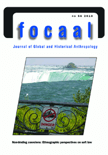
Focaal-Journal of Global and Historical Anthropology
Uncovering the Global Narratives of Our PastFocaal-Journal of Global and Historical Anthropology is an esteemed academic journal published by BERGHAHN JOURNALS, focusing on the intricacies of global and historical anthropology. With an impressive impact factor and positioned in the Q1 category of anthropology for 2023, this journal is recognized for its exceptional contributions to the field, ranking #121 out of 502 in the Social Sciences category on Scopus. Since its transition to Open Access in 2020, Focaal has made significant strides in democratizing academic knowledge, allowing broader accessibility for researchers, professionals, and students worldwide. The journal provides a platform for interdisciplinary dialogue and critical analysis, paving the way for innovative research and thought-provoking discussions. With a commitment to fostering a deeper understanding of anthropological practices and their global implications, Focaal is an essential resource for anyone engaged in contemporary anthropological studies.
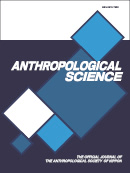
ANTHROPOLOGICAL SCIENCE
Advancing anthropological insights for a deeper understanding of humanity.ANTHROPOLOGICAL SCIENCE is a prominent journal in the field of anthropology, published by the Anthropological Society of Nippon since 1993. With a rich pedigree of scholarly contributions, this journal is an essential platform for disseminating research findings and theoretical discussions that push the boundaries of anthropological knowledge. Currently ranked in the Q3 category in Anthropology by 2023 metrics, ANTHROPOLOGICAL SCIENCE boasts an impressive position at #163 out of 502 in Scopus, placing it in the 67th percentile among its peers. While it operates under a traditional access model, the journal supports a diverse range of anthropological research encompassing cultural, biological, and archaeological perspectives. Researchers, professionals, and students will find valuable insights and innovative methodologies that foster a richer understanding of human societies and behaviors. The current trends and findings published in this journal make it a crucial resource for those involved in anthropological studies or related fields.

ANTHROPOLOGICAL QUARTERLY
Shaping the Future of Anthropological DiscourseANTHROPOLOGICAL QUARTERLY, published by the George Washington University Institute of Ethnographic Research, stands as a vital resource in the field of anthropology and broader arts and humanities studies. With an ISSN of 0003-5491 and an E-ISSN of 1534-1518, this esteemed journal has been contributing to academic discourse since its establishment in 1981. The journal holds a respected position in both the Q2 category for Anthropology and the Q2 category for Arts and Humanities (miscellaneous), demonstrating its impact and relevance, as evidenced by its rank of #152 out of 502 in the Social Sciences sector for anthropology and rank of #179 out of 552 in the Arts and Humanities field. Researchers, professionals, and students can rely on ANTHROPOLOGICAL QUARTERLY for rigorous peer-reviewed articles that push the boundaries of ethnographic research and anthropological theory, addressing contemporary issues with scholarly precision. The journal’s commitment to fostering critical analysis and interdisciplinary perspectives establishes it as an essential platform for advancing knowledge within its diverse and dynamic field.
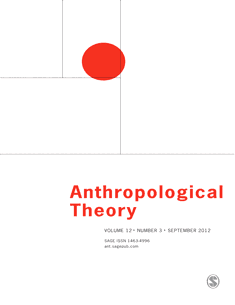
Anthropological Theory
Pioneering New Frontiers in Human UnderstandingAnthropological Theory, published by SAGE Publications Ltd, stands at the forefront of the field of anthropology, delivering cutting-edge research and critical analyses that shape contemporary understanding of human societies. With its ISSN 1463-4996 and E-ISSN 1741-2641, this distinguished journal boasts an impressive impact factor and has been recognized in the Q1 quartile category across both anthropology and arts and humanities disciplines, reflecting its high citation rates and scholarly influence. Covering a wide range of topics from cultural practices to social dynamics, Anthropological Theory serves as an essential resource for researchers, professionals, and students alike, fostering a rich dialogue within the academic community. The journal's continuous publication since 2001 ensures a dynamic platform for emerging theories and methodologies, providing invaluable insights for those engaged in anthropological discourse. Its recognition within the top percentile rankings of Scopus further underscores its significance and attractiveness to contributors seeking to disseminate their work on a global stage.
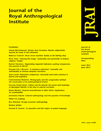
JOURNAL OF THE ROYAL ANTHROPOLOGICAL INSTITUTE
Illuminating the Rich Tapestry of HumanityJOURNAL OF THE ROYAL ANTHROPOLOGICAL INSTITUTE, published by Wiley, stands as a prestigious platform for scholarly discourse in the field of anthropology. With an ISSN of 1359-0987 and an E-ISSN of 1467-9655, this journal has been a vital resource for researchers, professionals, and students since its inception, featuring contributions that push the boundaries of understanding in both cultural and social anthropology. The journal’s rigorous peer-review process affirms its high academic standards, reflected in its top-tier Q1 rankings in both the Anthropology and Arts and Humanities categories for 2023. With a current ranking of #78 out of 502 in Social Sciences Anthropology and #138 out of 552 in Miscellaneous Arts and Humanities, it inhabits a critical space within academia, addressing seminal issues and innovative research. While the journal is not open access, it remains accessible to those affiliated with institutions that provide subscriptions, ensuring that groundbreaking anthropological insights are disseminated widely within the academic community. As it converges from 1995 to the present, the JOURNAL OF THE ROYAL ANTHROPOLOGICAL INSTITUTE continues to shape the landscape of anthropological research, engaging a diverse readership eager to explore the intricate tapestry of human cultures.

Bulletin de la Societe Prehistorique Francaise
Championing Innovative Methodologies in Prehistoric ResearchBulletin de la Societe Prehistorique Francaise (ISSN: 0249-7638; E-ISSN: 1760-7361), published by the SOCIETE PREHISTORIQUE FRANCAISE, stands as a pivotal journal within the domain of archaeology, particularly emphasizing prehistoric studies. With its classification in the Q2 quartile of both the arts and humanities as well as social sciences in archaeology, the journal positions itself among the top 25% of publications in these categories as of 2023. This distinguished ranking reflects its significant contribution to the field, providing researchers, professionals, and students with critical insights and innovative methodologies related to prehistoric research. Although open access options are currently unavailable, the journal is committed to fostering academic discourse and sharing knowledge that influences contemporary archaeological practices. As a member of the elite academic community, Bulletin de la Societe Prehistorique Francaise is highly regarded for its rigorous peer-review process and dedication to the advancement of archaeology, making it an essential resource for anyone invested in understanding our historical roots.